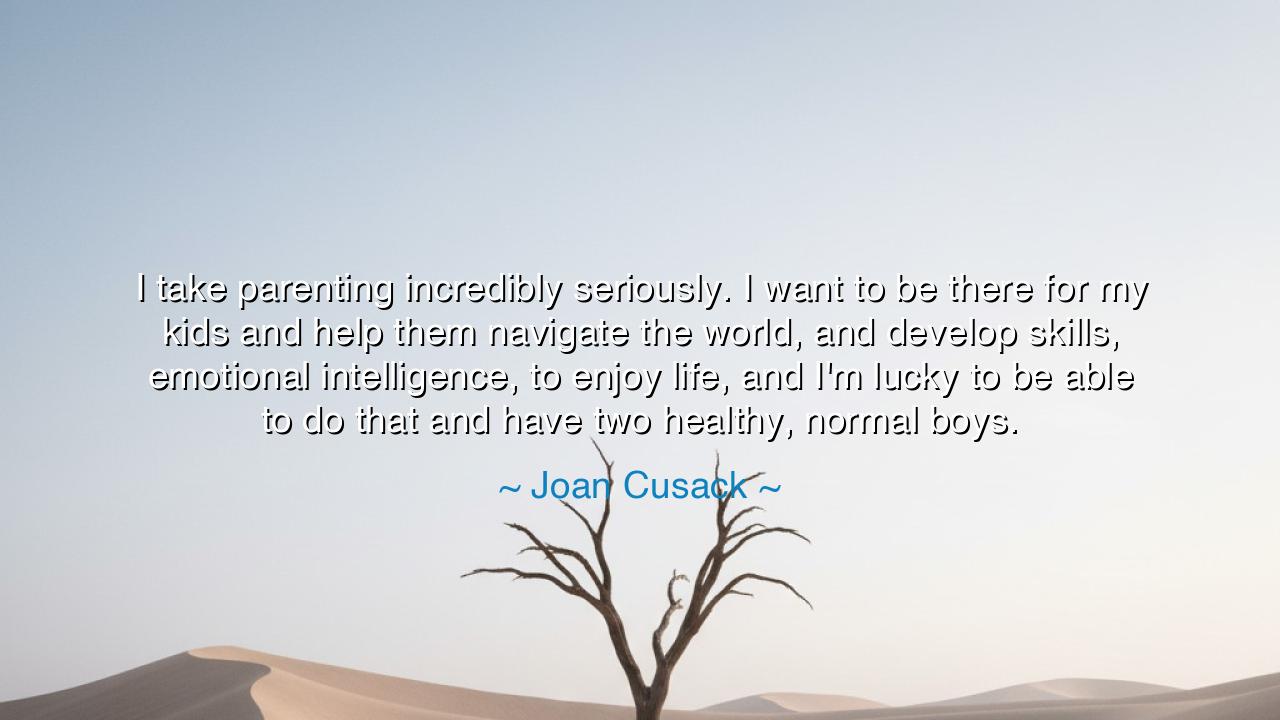
I take parenting incredibly seriously. I want to be there for my
I take parenting incredibly seriously. I want to be there for my kids and help them navigate the world, and develop skills, emotional intelligence, to enjoy life, and I'm lucky to be able to do that and have two healthy, normal boys.






The words of Joan Cusack, spoken with the humility of a mother and the wisdom of one who has lived deeply, resound with quiet strength: “I take parenting incredibly seriously. I want to be there for my kids and help them navigate the world, and develop skills, emotional intelligence, to enjoy life, and I'm lucky to be able to do that and have two healthy, normal boys.” In this reflection, Cusack touches upon one of the oldest and most sacred duties known to humankind — the art of parenting, not as possession or authority, but as guidance, presence, and love made wise through patience. She reminds us that raising children is not simply about providing for their bodies, but also about shaping their hearts and minds to face the vastness of the world with grace and courage.
From the beginning of civilization, the ancients understood that parenthood was the cornerstone of human continuity. In the clay tablets of Sumer, in the papyrus scrolls of Egypt, in the dialogues of Greece and the teachings of Confucius, the duty of the parent was celebrated as the noblest form of leadership. To raise a child was to shape the future — to plant seeds in a soil one might never see bloom, yet upon which all generations depend. Joan Cusack’s words echo this ancient truth. She does not speak of fame, wealth, or achievement, but of presence — of the quiet heroism that lies in showing up, day after day, to help a young soul grow into itself.
Her emphasis on emotional intelligence — the ability to feel, to understand, and to respond with empathy — is a wisdom the ancients themselves would have revered. The Stoics spoke of temperantia, the harmony of feeling and reason; the Buddhists taught compassion as the highest form of enlightenment. To teach a child intellect without emotion is to give them sight without light — knowledge without wisdom. Cusack’s insight, then, is a call to modern parents to remember what the ancients never forgot: that the heart must be educated alongside the mind. A child who knows how to love, to forgive, to persevere, and to find joy amid life’s trials will possess treasures greater than any earthly inheritance.
Consider the story of Marcus Aurelius, the philosopher-king of Rome. Though burdened with empire and war, he often wrote to himself about how he must raise his son, Commodus, to be virtuous, humble, and kind. Yet despite his wisdom, history tells us that Commodus grew cruel and self-indulgent — a reminder that even the greatest minds can struggle with the mystery of parenting. For parenting is not the shaping of clay, but the nurturing of flame. One cannot control the fire; one can only feed it wisely and protect it from the wind. Cusack’s words reflect this understanding — that to “help children navigate the world” is not to command them, but to walk beside them until they can walk alone.
When she says, “I’m lucky to be able to do that,” Cusack expresses not entitlement but gratitude — the profound gratitude of one who sees parenting not as a burden but as a blessing. In her words, there is a humility that honors both the fragility and the beauty of family life. She knows, as all wise parents do, that health and normalcy are gifts, not guarantees. In that awareness lies the spiritual foundation of good parenting — the understanding that love, in its purest form, is gratitude made active, a daily practice of giving thanks by giving oneself.
The deeper meaning of Cusack’s reflection lies in her understanding that parenting is legacy. The lessons we impart to our children are the ripples that move forward into eternity. To raise a child who can “enjoy life” — who can find beauty even in hardship, and hope even in uncertainty — is to leave the world better than we found it. The parent is, in this sense, both gardener and philosopher: one who cultivates the soil of the future while embodying the virtues they wish to see flourish in it.
Thus, the teaching of Joan Cusack’s words is timeless: to take parenting seriously is to take life seriously. It is to understand that the shaping of one soul is the shaping of the world. If you are a parent, be present — not only in body, but in heart. Speak with kindness. Listen with patience. Teach not only the skills of survival, but the art of joy. Help your children to know themselves, to forgive themselves, and to believe that their existence is a gift to the earth.
And if you are not a parent, take these words as a broader call to nurture the world around you. Be a guide, a mentor, a source of understanding to those who follow after you. For every act of care is a thread in the tapestry of humanity. Parenting, in the truest sense, is the passing of light from one generation to the next — a fire that burns not to consume, but to illuminate. And when we, like Joan Cusack, live with gratitude, devotion, and love, then indeed the world will know that we have fulfilled the most ancient duty of all: to help others grow, and in doing so, to become more fully human ourselves.






AAdministratorAdministrator
Welcome, honored guests. Please leave a comment, we will respond soon